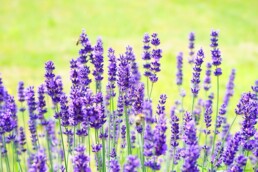Lavender
Scientific name
Lavender is scientifically known as Lavandula.
Location
Lavender is native to the Mediterranean region, but is grown in many parts of the world with temperate, dry climates. It is especially common in regions such as southern Europe, North Africa, southwest Asia and parts of North America.
Family
It belongs to the family Lamiaceae, which also includes other aromatic herbs such as mint and rosemary.
Description
Lavender is a herbaceous perennial plant that grows in compact bushes. Its leaves are linear, narrow and greyish-green. Its flowers are small and tubular, usually violet or blue in colour, although there are varieties with pink or white flowers. Lavender is known for its characteristic and pleasant scent.
Distribution
Lavender is cultivated in many parts of the world, but is native to the Mediterranean region, where it is found growing wild on hills and sunny slopes.
Use
Lavender is mainly used for its essential oil, which is extracted from the flowers. Lavender essential oil is used in perfumery, aromatherapy and personal care products because of its relaxing fragrance. It is also used in the manufacture of cleaning products and detergents due to its deodorising and antibacterial properties. In addition, lavender is grown in ornamental gardens because of its beauty and aroma. Its flowers can also be dried and used in aromatic sachets.
Lavender is known for its calming properties and is used in herbal teas and oils to promote relaxation and reduce stress.


